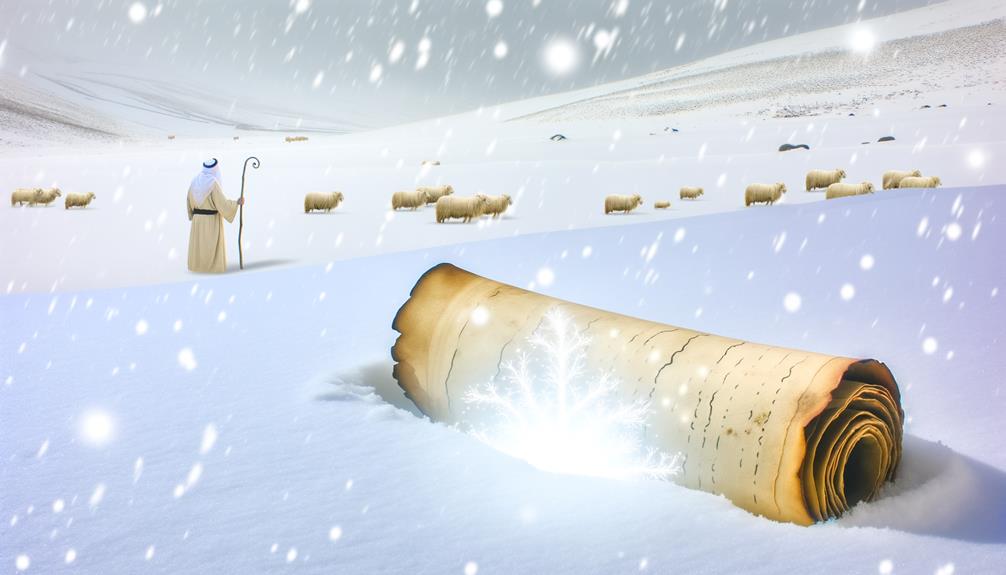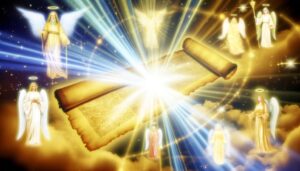White as Snow Bible Verse Meaning: Purity and Redemption
The phrase ‘white as snow‘ in the Bible symbolizes purity, forgiveness, and divine cleansing. Key verses such as Isaiah 1:18 and Psalm 51:7 highlight the transformative power of divine grace, where sins as red as scarlet are made as white as snow.
This vivid imagery signifies spiritual renewal and the eradication of sin, aligning believers with God’s sanctity. Snow’s immaculate whiteness serves as a metaphor for divine intervention and forgiveness.
In both Old and New Scriptures, it emphasizes God’s promise of moral transformation and renewal. Further exploration into scripture will reveal deeper insights into divine grace and redemption.

White as Snow Bible Verse Meaning: Symbolism of Purity, Forgiveness, and Redemption
| Aspect | Description |
|---|---|
| Key Bible Verses | Isaiah 1:18 – “Though your sins are like scarlet, they shall be as white as snow.” Psalm 51:7 – “Wash me, and I shall be whiter than snow.” |
| Literal Meaning | Refers to the pure, flawless appearance of freshly fallen snow, representing absolute cleanliness and perfection. |
| Spiritual Symbolism | Symbolizes spiritual purity, forgiveness, and the complete cleansing of sin through God’s grace and mercy. |
| Context of the Verses | God’s promise of redemption to those who repent, emphasizing His ability to wash away even the deepest stains of sin. |
| Connection to Redemption | Highlights the transformative power of God’s forgiveness through the sacrifice of Jesus, restoring believers to spiritual wholeness. |
| Application for Believers | Encourages repentance, faith in God’s mercy, and the assurance that no sin is beyond God’s ability to cleanse and renew. |
| Modern Interpretation | A reminder of the hope and freedom found in God’s forgiveness, symbolizing new beginnings, inner peace, and spiritual renewal. |
Biblical Appearances

Biblical appearances of specific verses often serve as key theological cornerstones, reflecting the historical and cultural contexts in which they were written.
The phrase ‘white as snow’ emerges in various scriptural instances, exemplifying themes of purity, forgiveness, and divine cleansing.
Notable references include Isaiah 1:18, where God invites repentance by promising, ‘though your sins are like scarlet, they shall be as white as snow.’ This metaphor illustrates the transformative power of God’s grace, juxtaposing sin’s stain with the pristine nature of snow.
Additionally, in Psalm 51:7, David pleads for purification, saying, ‘wash me, and I shall be whiter than snow.’
These verses encapsulate profound theological insights into God’s redemptive capabilities, resonating across diverse epochs and cultures.
Old Testament Insights

The Old Scripture offers profound insights into the themes of prophetic symbolism and the quest for purity and cleansing.
Through its rich tapestry of narratives and prophecies, it reveals the layers of meaning behind symbolic acts and rituals, often pointing to future fulfillment.
Examining these elements allows for a deeper understanding of how these ancient texts convey spiritual truths and ethical imperatives.
Prophetic Symbolism Unveiled
How does the intricate tapestry of prophetic symbolism in the Old Scriptures reveal deeper theological truths and eschatological insights?
The imagery of ‘white as snow’ often appears in prophetic texts, particularly in Isaiah 1:18, where it symbolizes divine forgiveness and transformative purity. This metaphor extends beyond mere physical whiteness, embodying a profound spiritual renewal promised by God.
Prophets like Isaiah utilized such vivid imagery to communicate God’s covenantal assurances and the future hope of redemption. The eschatological dimension unfolds as these symbols point to an ultimate restoration and purification, prefiguring the Messianic age.
Therefore, the Old Testament’s prophetic symbolism serves as a rich conduit for understanding God’s redemptive plan and the promised future glory.
Purity and Cleansing
In the Old Scripture, concepts of purity and cleansing are intricately linked to ritual practices and moral commandments, reflecting the profound theological significance of holiness in the covenantal relationship between God and His people. The imagery of being ‘white as snow’ is mainly found in prophetic literature, symbolizing the divine act of forgiveness and purification. This metaphor underscores the shift from sinfulness to righteousness, achieved through God’s mercy.
| Concept | Scriptural Reference |
|---|---|
| Ritual Purity | Leviticus 16:30 |
| Moral Cleanliness | Psalm 51:7 |
| Prophetic Cleansing | Isaiah 1:18 |
| Holiness | Exodus 19:6 |
These references illustrate the multifaceted approach to purity, encompassing both external rituals and internal transformations.
New Testament Context

In examining the New Scripture context, it is essential to explore themes of purity through Christ, as evidenced in passages that emphasize moral and spiritual cleanliness.
The symbolism in Revelation further illustrates these concepts through vivid imagery that conveys ultimate redemption and divine cleansing.
Collectively, these points highlight the transformative power of faith and the fulfillment of eschatological promises.
Purity Through Christ
Through the lens of the New Covenant, purity is often depicted as an intrinsic quality attainable only through the redemptive work of Jesus Christ. This concept is vividly illustrated in various New Scriptures, emphasizing the transformative power of Christ’s sacrifice.
Key elements of this purity include:
- Forgiveness of sins as seen in Ephesians 1:7.
- Spiritual rebirth highlighted in John 3:3-5.
- Cleansing by the Word reflected in Ephesians 5:26.
- Righteousness imputed by faith in Romans 4:5.
These elements collectively underscore the belief that true purity is not self-generated but is a divine attribute graciously bestowed upon believers through Christ’s atoning work.
Symbolism in Revelation
The Book of Revelation employs vivid and intricate symbolism to convey profound theological truths and eschatological visions. This apocalyptic text uses color imagery extensively, with “white” symbolizing purity, victory, and divine presence. For instance, Revelation 1:14 describes Christ with hair “white like wool, as white as snow,” signifying His eternal and unblemished nature. Similarly, Revelation 7:9 depicts a great multitude in white robes, symbolizing their triumph and sanctification through faith.
| Symbol | Interpretation |
|---|---|
| White robes | Purity and victory |
| White hair | Eternity and wisdom |
| White horse | Conquest and righteousness |
Understanding these symbols provides deeper insight into the text’s spiritual and prophetic messages, enriching one’s comprehension of the divine revelations.
Redemption and Cleansing
A pivotal theme in the New Scriptures is the concept of redemption and cleansing, which is elucidated through the sacrificial death and resurrection of Jesus Christ. This transformative act offers believers a means to be purified, akin to being made ‘white as snow.’
The metaphorical use of ‘white as snow’ in the New Canon symbolizes:
- Purity: The removal of sin’s stain.
- Renewal: A fresh beginning in one’s spiritual journey.
- Sanctification: A progressive work of becoming more Christ-like.
- Justification: Being declared righteous before God.
These elements collectively underscore the profound impact of Christ’s redemptive work, embodying both individual and communal reconciliation with God.
This imagery facilitates a deeper understanding of the spiritual purification available through faith in Jesus.
Symbolism of Snow

In biblical literature, snow frequently symbolizes purity, renewal, and the transformative power of divine intervention. This natural phenomenon, mentioned in various scriptures, is often employed metaphorically to illustrate spiritual cleansing and the erasure of sin. Snow’s immaculate whiteness is a vivid representation of the soul’s purification. Additionally, snow marks a seasonal change, denoting renewal and hope, as seen in passages such as Isaiah 1:18.
| Scripture Reference | Symbolism | Context |
|---|---|---|
| Isaiah 1:18 | Purity | Cleansing of sins |
| Psalm 51:7 | Renewal | Personal repentance |
| Daniel 7:9 | Divine Majesty | Vision of the Ancient of Days |
| Job 37:6 | God’s Sovereignty | Command over nature |
| Proverbs 31:21 | Care and Provision | Household management |
These references collectively underscore snow’s multifaceted symbolism in biblical texts.
Purity and Forgiveness

Drawing from various biblical scriptures, the concepts of purity and forgiveness are intrinsically linked, portraying the profound transformation of the human soul through divine grace.
These themes are vividly illustrated in passages such as Isaiah 1:18, which states, “Though your sins are like scarlet, they shall be as white as snow.” This metaphor underscores the cleansing power of forgiveness, rendering the soul pure.
- The image of a freshly fallen snow illustrates unblemished purity.
- Forgiveness as a divine act washes away moral stains.
- The soul’s transformation from sin to sanctity.
- The renewal of one’s spiritual state.
Such scriptural references emphasize that purity and forgiveness are not merely abstract ideals but attainable states through God’s grace.
Transformation Imagery

Scriptural narratives often employ vivid transformation imagery to depict the metamorphosis of the believer’s soul through divine intervention.
The phrase ‘white as snow‘ frequently symbolizes a profound change from a state of sinfulness to one of purity and righteousness. This imagery is not merely superficial but signifies a complete internal renewal, aligning the soul with God’s sanctity.
Such transformation is illustrated in verses like Isaiah 1:18, where the shift from scarlet sins to snow-white purity underscores the radical nature of divine redemption.
This metamorphosis, depicted through the cleansing whiteness of snow, encapsulates the believer’s journey from moral defilement to spiritual regeneration, emphasizing the transformative power of divine grace and intervention in the believer’s life.
God’s Cleansing Power

The concept of God’s cleansing power is fundamentally anchored in the biblical narrative, illustrating His ability to purify and restore the human soul through divine intervention.
Scriptural references abound, offering a vivid portrayal of this redemptive process:
- Isaiah 1:18: ‘Though your sins are like scarlet, they shall be as white as snow.’
- Psalm 51:7: ‘Wash me, and I shall be whiter than snow.’
- 1 John 1:9: ‘He is faithful and just to forgive us our sins and to cleanse us from all unrighteousness.’
- Ezekiel 36:25: ‘I will sprinkle clean water on you, and you will be clean.’
These verses collectively underscore the transformative potency of divine clemency.
Application in Daily Life

Understanding God’s cleansing power as depicted in Scripture allows believers to integrate these principles into their everyday lives, fostering spiritual growth and moral integrity.
By embracing the metaphor of being made ‘white as snow’ (Isaiah 1:18), individuals are reminded of the transformative power of repentance and divine forgiveness. This awareness encourages daily practices of self-examination, humility, and seeking God’s grace.
It also promotes ethical behavior, as believers endeavor to reflect the purity and righteousness granted through Christ. Additionally, this concept can enhance interpersonal relationships by fostering a spirit of forgiveness and reconciliation.
Consequently, the scriptural imagery of purity serves as a practical guide, inspiring a life marked by continual renewal and alignment with God’s will.
Conclusion
The phrase ‘white as snow’ in the Bible symbolizes purity, forgiveness, and transformation, illustrating God’s cleansing power.
An anticipated objection might question the relevance of ancient metaphors in contemporary faith practice. However, the timeless nature of these symbols offers profound insights into human spirituality and morality, transcending historical and cultural boundaries.
This enduring imagery not only emphasizes divine grace but also provides a foundational framework for understanding spiritual renewal and ethical living.






